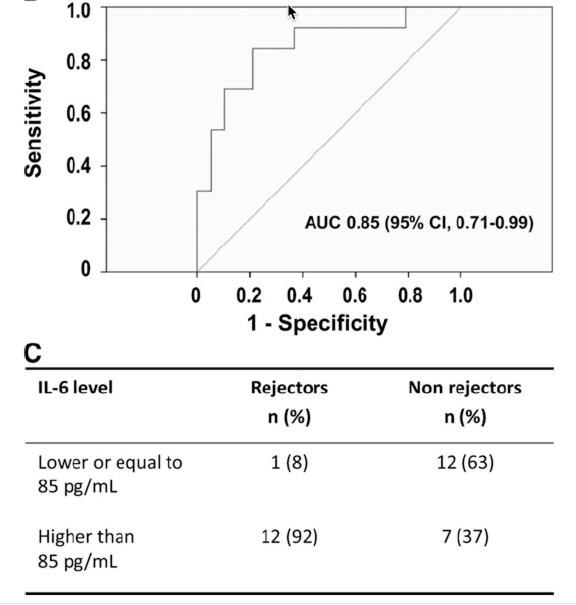BACKGROUND AND OBJECTIVES:
Acute rejection remains a problem in renal transplantation. This study sought to determine the utility of a noninvasive cytokine assay in screening of acute rejection.
DESIGN, SETTING, PARTICIPANTS, & MEASUREMENTS:
In this observational cross-sectional study, 64 patients from two centers were recruited upon admission for allograft biopsy to investigate acute graft dysfunction. Blood was collected before biopsy and assayed for a panel of 21 cytokines secreted by PBMCs. Patients were classified as acute rejectors or nonrejectors according to a classification rule derived from an initial set of 32 patients (training cohort) and subsequently validated in the remaining patients (validation cohort).
RESULTS:
Although six cytokines (IL-1β, IL-6, TNF-α, IL-4, GM-CSF, and monocyte chemoattractant protein-1) distinguished acute rejectors in the training cohort, logistic regression modeling identified a single cytokine, IL-6, as the best predictor. In the validation cohort, IL-6 was consistently the most accurate cytokine (area under the receiver-operating characteristic curve, 0.85; P=0.006), whereas the application of a prespecified cutoff level, as determined from the training cohort, resulted in a sensitivity and specificity of 92% and 63%, respectively. Secondary analyses revealed a strong association between IL-6 levels and acute rejection after multivariate adjustment for clinical characteristics (P<0.001).
CONCLUSIONS:
In this pilot study, the measurement of a single cytokine can exclude acute rejection with a sensitivity of 92% in renal transplant recipients presenting with acute graft dysfunction. Prospective studies are needed to determine the utility of this simple assay, particularly for low-risk or remote patients.
De Serres SA, Mfarrej BG, Grafals M, Riella LV, Magee CN, Yeung MY, Dyer C, Ahmad U, Chandraker A, Najafian N.
Clin J Am Soc Nephrol. 2012 Jun;7(6):1018-25.

